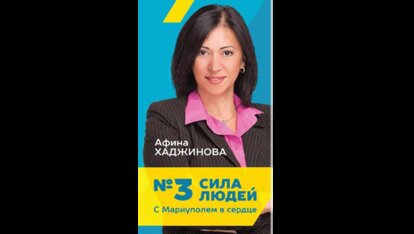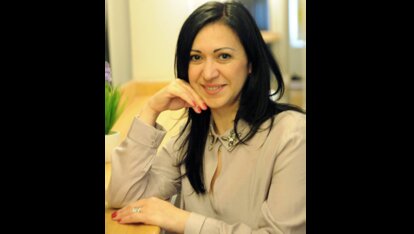Interview with Ms. Afina Khadzhynova, ‘Syla Lyudey’ Party, Ukraine

The Ukrainian political landscape is dominated by strong personalities such as Yulia Tymoshenko, Arseniy Yatsenyuk or Petro Poroshenko. As a rule, it is financially strong oligarchs and not citizens and their interests that are behind political parties. They lack both social support and programmatic content. As a result, Ukrainian election campaigns are among the most expensive in Europe, although living standards in the country are among the lowest.
A notable exception is the small liberal party ‘Syla Lyudey’ (1) , which is supported by the Friedrich Naumann Foundation for Freedom and has, among other small parties, worked its way up from the bottom since the days of the Revolution of Dignity.
These liberals achieved decent results in the municipal elections in Kryvyi Rih (2) and Mariupol (3) with 4.7% and 8.0% respectively. Afina Khadzhynova, an activist from Mariupol, speaks about what led to their success, what difficulties the party faces and what its goals for the future are in an interview with Yevgen Lozynskyy, a political science major at the Duisburg-Essen University and currently also a Friedrich Naumann Foundation trainee in Kiev.
Good evening Ms. Khadzhynova. How did the ‘Syla Lyudey’ party emerge in Mariupol, and what does it stand for?
Our group was formed in October 2014, when we offered our support to Maksim Borodin (4) in his candidacy for the Werkhowna Rada, our Parliament. He is known well outside Mariupol, throughout the entire Ukraine, as an environmentalist. After a meeting with Maksim Borodin we established the organisation ‘Initiative Group Together’. The people who were present at that meeting form the core of our team. Many committed activists from Mariupol, who are concerned about Ukraine’s unity and progress and human dignity as such, started networking via Facebook thereafter. One of us got to know Alexander Solontay (5) from the ‘Syla Lyudey’ party and shared with him our wish to participate more actively in our city’s political life. Solontay invited us to a seminar in Kiev organised by the party. There, we met party members from all over Ukraine. We got acquainted with the party programme and could identify ourselves with its liberal principles. Given our active involvement up to that point, we already carried a certain responsibility. We simply needed to participate in the 2015 municipal elections as part of the ‘Syla Lyudey’. 42 candidates stood for election to the City Council, while Maksim ran for mayor. Personally, I was not able to win in my constituency, but I nevertheless continue to see myself as a PR manager and activist. I previously worked as a teacher and translator.
Your party won 8% of the vote during the 2015 municipal elections. It is a huge success for such a young party. How do you explain it?
We really are a team and we believe in our cause. But our electoral success is also related to our previous activities. The Initiative Group Together had already been engaged in city governance supervision and fighting corruption. When Mariupol was under attack, we worked as volunteers and organised relief and support from all over Ukraine and Europe. So people knew us already. Our election campaign was based on voluntary work. None of us received any money. We organised a crowd-funding campaign via Facebook. 75 000 Ukrainian hryvnia (about 2 500 Euros) was gathered through it. The money was used to print newspapers, flyers, stickers, T-shirts, etc. With no access to regional newspapers or TV channels, as those are under the control of the Opposition Bloc (6) , we were ridiculed when we decided to participate in the municipal elections. In terms of resources, we were no match for other parties. But we went out on the street, distributing papers and conversing with retirees on park benches. Many different people supported us. Using social networks, we asked for their help in distributing our newspapers and flyers. All our mailboxes were full when we got home. It gave us tremendous strength, as we felt citizens’ support all around us.
How is your work in Parliament and the different committees going? What have you achieved so far and what difficulties do you face?

We won 5 out of 54 seats in the Mariupol City Parliament. The rest of the seats went to either the Opposition Bloc or the ‘Nasch Kray’ party (7) . Naturally, this makes our work extremely difficult. For example, we put forward and implemented an initiative to have heat meters installed in apartment buildings. Waste of energy is a huge issue at home and no one feels responsible. Our group uncovers corruption cases and constantly fights with old officials who stand in the way of reform. The education officer for our region had to resign as a result of our inquiries. We were also able to prove some municipal companies’ corrupt practices. But it is difficult. Maksim Borodin, for example, was physically assaulted in the park after a plenary session, while the police are attempting to protract the case. The Opposition Bloc represents mainly Metinvest’s (8) interests; after all, it’s their largest sponsor. 14 Opposition Bloc MP’s are at the same time employees of SKM Holding Group (9) , Metinvest being part of that group. During the first two months we counted ourselves among the moderate opposition. But we see no political will for reform and modernisation on the part of the Opposition Bloc. In addition to our political involvement, we are also engaged in social projects. For example, we organise a reading contest for kids.
As you already mentioned, your city was shelled by separatists. The front is just 20 kilometers away from here. How does this virtual state of war affect the population and your work?
At the moment, it is actually fairly quiet. Soldiers from all over Ukraine protect us. Some citizens dislike this military presence, but I personally do not understand this sentiment. Them being here, it gives me a sense of safety. We actually advocate that some streets should be renamed after them. There certainly were problems with soldiers in the past, due to their drinking, but this has ceased after numerous activists approached them on the matter. Furthermore, alcohol is no longer sold to people in uniform in the city.
What are your party’s goals for the future?
Currently, our main objective is fighting corruption. We are committed to ensuring that an online administration system is set up, giving citizens more comfort. We will continue to be active, organising different events, as we want to keep the momentum and remain in the spotlight. Of course, for the future ‘Syla lyudey’ will strive towards wining the majority of seats in the city parliament and having its candidate elected to the mayoral office!
For more information for Ukraine and FNF's work there please visit the website and Facebook page of FNF Ukraine.
Notes:
1. Party website in English: http://sylalyudey.org/en/
2. Industrial city in Eastern Ukraine, with approximately 650 000 residents.
3. An industrially defined city with approximately 450 000 residents on the Azov Sea in the Donetsk Oblast, located only some 20 kilometers away from the frontline.
4. Erstwhile an environmentalist and 2015 Syla Lyudey mayoral candidate in Mariupol.
5. Political activist and co-founder of ‘Syla Lyudey’.
6. The Party of Regions’ successor; supported financially by a number of oligarchs.
7. A party project for former Party of Regions voters, supported by the Presidency.
8. Largest steel factory in the region, owned by the oligarch Rinat Akhmetov.
9. SKM Holding holds stakes in the construction, metal and energy sectors